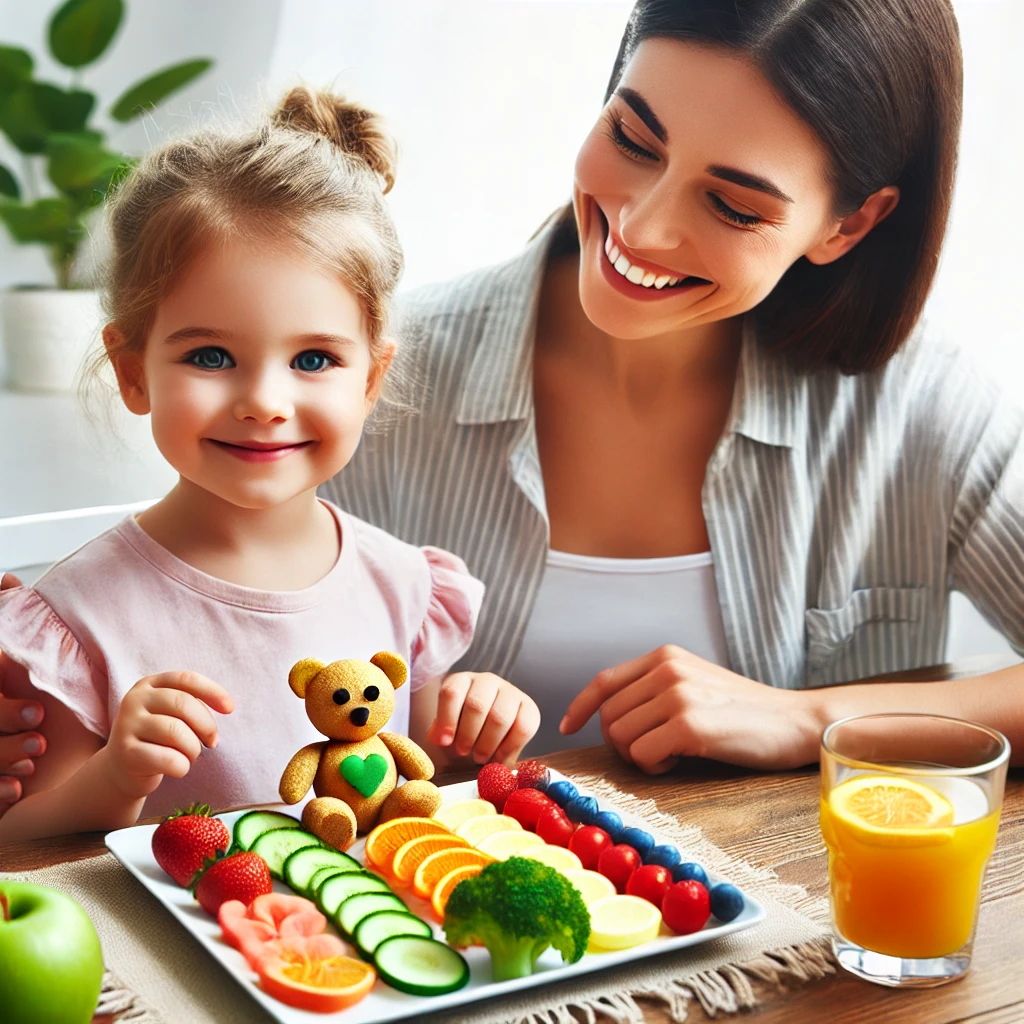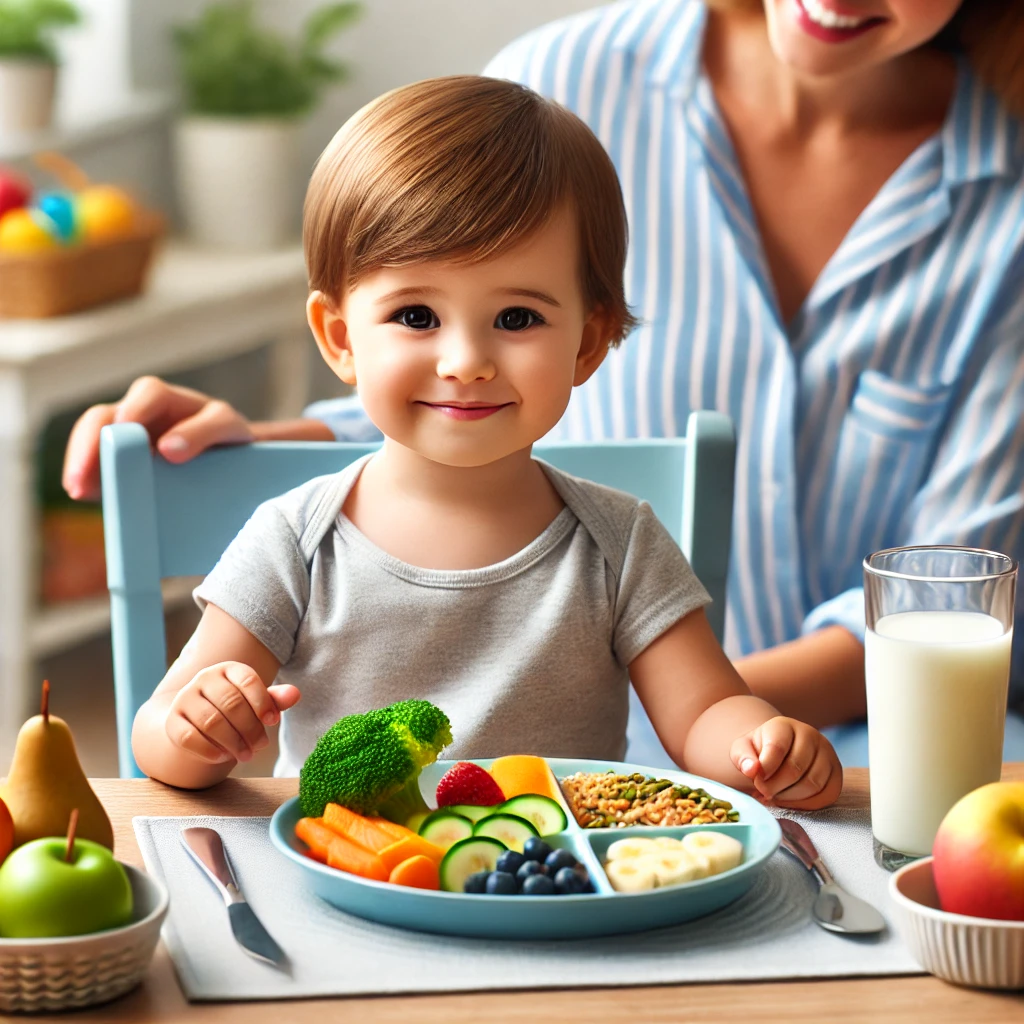Balanced Diet for Preschoolers: What Every Parent Should Know
Why a Balanced Diet Matters
A child’s early years are crucial for growth and brain development. A well-balanced diet ensures they get the right nutrients for energy, immunity, and cognitive skills. Proper nutrition not only supports physical growth but also influences a child’s behavior, learning ability, and overall well-being. A diet rich in essential nutrients helps preschoolers maintain a strong immune system, develop good eating habits, and stay active throughout the day.

Essential Nutrients for Preschoolers
To ensure proper growth and development, preschoolers need a variety of nutrients. Here are some key components of a balanced diet:
Proteins
Supports muscle and tissue growth. Good sources include:
- Eggs
- Milk
- Lentils
- Fish
- Chicken
Carbohydrates
Provides energy for daily activities. Healthy options include:
- Whole grains (brown rice, whole wheat bread, oats)
- Fruits (bananas, apples, oranges)
- Vegetables (sweet potatoes, carrots, peas)
Healthy Fats
Essential for brain development and overall health. Include:
- Nuts (almonds, walnuts)
- Seeds (chia, flaxseeds, sunflower seeds)
- Avocados
- Olive oil
Vitamins & Minerals
Strengthen immunity and support various body functions. Sources include:
- Green vegetables (spinach, broccoli, kale)
- Dairy products (cheese, yogurt, milk)
- Citrus fruits (oranges, lemons, strawberries)
Healthy Meal Plan for Preschoolers
A structured meal plan ensures that preschoolers receive adequate nutrition throughout the day. Here’s a simple yet effective meal plan:
Breakfast
- Whole wheat toast with peanut butter & banana slices
- A glass of milk
- Scrambled eggs or boiled eggs
Mid-Morning Snack
- Yogurt with chopped fruits and a drizzle of honey
- A handful of nuts and seeds
Lunch
- Dal, rice, and mixed vegetable curry
- Whole wheat chapati with paneer sabzi
- A bowl of cucumber and carrot sticks
Evening Snack
- Cheese cubes and cucumber sticks
- Whole grain crackers with hummus
Dinner
- Roti with paneer sabzi or vegetable stir-fry
- A bowl of homemade soup
- A glass of warm milk
Fun Diet Activity: The Colorful Plate Challenge
Encouraging kids to eat a variety of colorful fruits and vegetables can be fun! Try the Colorful Plate Challenge:
- Ask kids to include at least three colors on their plate during each meal.
- Use a reward system (stickers, praise) to encourage them to try different colored foods.
- Teach them about the benefits of each color (e.g., “Green foods make you strong! Red foods help your heart!”)
Healthy Snack Ideas for Preschoolers: Tasty & Nutritious
Why Healthy Snacks Matter
Snacks keep kids energized between meals and prevent overeating at mealtimes. Choosing nutritious snacks over processed foods improves digestion and brain function. Healthy snacking helps maintain steady energy levels, prevents mood swings, and contributes to overall growth and development.
Best Healthy Snacks for Preschoolers
Providing wholesome snack options ensures that kids receive essential nutrients. Here are some great snack ideas:
- Fruit & Yogurt Parfaits: Layer yogurt with chopped fruits and nuts for a delicious and nutritious treat.
- Whole-Grain Crackers with Cheese: A combination of fiber and protein to keep little tummies full.
- Homemade Veggie Sticks with Hummus: Carrot, cucumber, and bell pepper sticks served with hummus are packed with vitamins.
- Banana & Peanut Butter Sandwich: A natural energy booster that provides healthy fats and protein.
- Boiled Eggs with Whole Wheat Toast: A great source of protein and fiber to keep kids active.
- Smoothies with Fruits & Seeds: Blend fresh fruits, yogurt, and chia seeds for a refreshing snack.
- Popcorn (Lightly Salted, Air-Popped): A fiber-rich snack that’s a healthy alternative to chips.
- Homemade Granola Bars: Made with oats, honey, and nuts, they are a great source of sustained energy.
Healthy Snack Activity: DIY Snack-Making
Make snack time interactive and fun by allowing kids to create their own snacks.
How to Play:
- Set up a DIY snack station with bowls of yogurt, chopped fruits, nuts, and granola.
- Let kids assemble their own fruit & yogurt parfaits, adding their favorite toppings.
- Encourage them to name their creations and describe the flavors they enjoy.
By making healthy eating fun and engaging, parents can help their preschoolers develop a positive relationship with nutritious foods. Creating balanced meals and incorporating fun food activities will lay the foundation for lifelong healthy eating habits!


